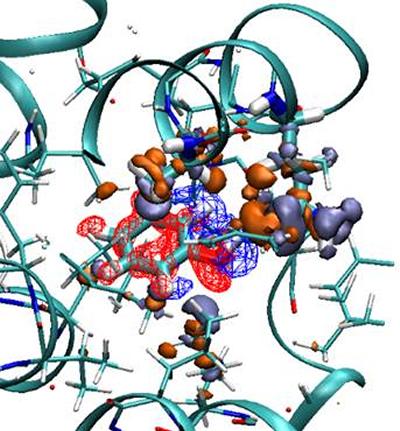Researchers at Southampton have increased the capabilities of a powerful quantum chemistry computer modelling tool, contributing to innovation across a range of industry sectors. The tool, known as ONETEP, enables highly accurate simulations of chemical systems with thousands of atoms, making the development of materials more efficient and cost effective. It has accelerated improvements in areas such as solar, battery and high-voltage electrical power, and medical drug optimisation.

Research challenge and context
Quantum chemistry involves studying the reactions between molecules at the level of individual atoms. To tackle problems in this field, large-scale computer simulations are required to predict how molecules will behave in chemical reactions, so that unsuccessful results can be weeded out before the laboratory testing stage.
The principles for a theory on which to base such simulations were established in the 1920s, and later these paper-based theories became computer programs. However, the amount of computational power needed to apply these first-principle approaches increases steeply with the number of atoms, limiting the simulations that can be performed to few tens of atoms. Simulations could be scaled up to many thousands of atoms through a method known as linear scaling, but maintaining accuracy at this scale was a challenge. Researchers were therefore forced to choose - use an unrealistically small model to obtain quantum mechanical results, or compromise on accuracy.
Professor Chris Skylaris was the instigator and one of the three original co-developers of ONETEP, a linear-scaling computer program that offered a workable way of extending calculations to much larger molecules than previously possible. More work was needed to optimise ONETEP in order to realise its commercial potential and apply it to real-world industry challenges.
Our solution
Led by Chris, Southampton researchers worked on novel linear-scaling algorithms to expand the capabilities of ONETEP.
For example, by developing new ONETEP algorithms they achieved a dramatic increase in the number of processing cores the program can use on parallel supercomputers, increasing the number of atoms that can be studied to tens of thousands and reducing the time taken to run a simulation. Other research streams resulted in faster and more accurate models to simulate the effect of the solvent – a necessary ingredient in chemical reactions – and improved methods for calculations on chemical systems that involve metals.
What was the impact?
To date, more than 300 organisations across a range of sectors have used ONETEP to accelerate materials design, reduce development costs and address modelling challenges that were previously out of reach.
In the field of sustainable energy, ONETEP simulations have enabled specialty chemicals company Johnson Matthey to advance its understanding towards developing more efficient catalysts, for applications including chemical synthesis and fuel cells such as those used in electric vehicles. Science and technology company Merck has used the program to understand the photovoltaic effect in organic solar cells and design new materials to overcome some of the performance limitations of existing organic photovoltaic materials.
ONETEP has also contributed to improvements in energy infrastructure. It was used by ABB, a leader in power grids and electrification products, to gain insights into the materials used for electrical insulation in order to develop more efficient high-voltage cables.
In the field of medical diagnostics, Southampton researchers collaborated with scientists at pharmaceutical company Boehringer Ingelheim, helping to strengthen its approach to drug optimisation.
In addition, ONETEP has made a direct economic impact; greater industry uptake has resulted in revenues of over £2m between 2013 and 2020.

